Baker Academic Reformation History Collection (6 vols.)
Digital Logos Edition
Overview
The Baker Academic Reformation History Collection contains six volumes on two key reformers: Martin Luther and John Calvin. This collection provides readers with the best in scholarship from well-known names in the field of Reformation studies including Richard A. Muller, Robert Kolb, Randall C. Zachman, and Charles P. Arand.
It studies Martin Luther’s life, legacy, and theology, focusing on his views on anthropology and God’s work through Scripture, as well as his use of biblical narrative in preaching and writing. It analyzes John Calvin’s ministry and theology, relationship to Roman Catholicism, theological and exegetical writings, and contrasting views with other reformers. Special focus is given to the early development of Calvinist and Reformation thought.
Unpack the developments of each reformer’s theology throughout history. Read through these theological reflections and discover the impact and contributions Luther and Calvin have provided today’s church.
The Logos Bible Software edition of the Baker Academic Reformation History Collection is designed to encourage and stimulate your study and understanding of the reformers and their theology. Scripture passages link directly to your English translations and to the original-language texts, and important theological concepts link to dictionaries, encyclopedias, and a wealth of other resources in your digital library. In addition, you can perform powerful searches by topic and find what other authors, scholars, and theologians have to say about Martin Luther and John Calvin.
This title is included in the following collections
You can save when you purchase this product as part of a collection.
Baker Ultimate Collection 2022...
$38,273.89$22,949.99

Key Features
- Studies the development of Reformation thought
- Provides theological reflections on Martin Luther and John Calvin
- Analyzes each reformer’s theology, ministry, and contemporary impact
Product Details
- Title: Baker Academic Reformation History Collection
- Publisher: Baker Academic
- Volumes: 6
- Pages: 1,504
- Christian Group: Reformed
- Resource Type: Topical
- Topic: Reformation
Individual Titles
- Christ and the Decree: Christology and Predestination in Reformed Theology from Calvin to Perkins by Richard A. Muller
- The Genius of Luther’s Theology: A Wittenberg Way of Thinking for the Contemporary Church by Charles P. Arand and Robert Kolb
- John Calvin as Teacher, Pastor, and Theologian: The Shape of His Writings and Thought by Randall C. Zachman
- John Calvin and Roman Catholicism: Critique and Engagement, Then and Now edited by Randall C. Zachman
- Luther and the Stories of God: Biblical Narratives as a Foundation for Christian Living by Robert Kolb
- Martin Luther as Prophet, Teacher, and Hero: Images of the Reformer, 1520–1620 by Robert Kolb
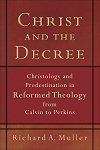
In Christ and the Decree, one of the foremost scholars of Calvinism today expounds the doctrines of Christ and predestination as they were developed by Calvin, Bullinger, Musculus, Vermigli, Beza, Ursinus, Zanchi, Polanus, and Perkins. Muller analyzes the relationship of these two doctrines to each other and to the soteriological structure of the system.
This seminal work on the relationship between Calvin and the Calvinists includes a contextualizing preface by the author. It offers a succinct introduction to the early development of Calvinism/Reformation thought.
[Muller] has undertaken a massive exposition of the teachings of Reformed theologians extending from Calvin through William Perkins . . . concerning predestination and Christology. . . . Anyone who wishes to refute Muller’s conclusions will necessarily have to spend many long hours with the Latin tomes which constitute the basis for his thorough study. Meanwhile, those who interpret ‘Calvin and Calvinism’ would be well advised to give heed to Muller’s conclusions.
—Fides et Historia
Richard Muller does his homework. His is one of few books in recent memory to address seriously the systematic-theological issues inherent in the debate concerning the relationship of predestination and Christology in the thought of Calvin and his successors. This study is a welcome addition to the secondary sources in the field. Students—whether they finally agree or disagree with Professor Muller’s views—will want to read thoroughly his carefully researched arguments. . . . One will . . . find a wealth of valuable research and trenchant observations in an area of Reformed thought which often is neglected, and even more often treated only with superficial scholarship. . . . This book is worthy of reflection and argument.
—Scottish Journal of Theology
It is rare nowadays to read a scholarly analysis of the Reformation and post-Reformation literature which renders a faithful interpretation of the theology of the Reformers. Richard A. Muller’s masterful study . . . provides a welcome breath of fresh air. . . . The author has achieved a notable contribution to the study of the doctrine of Christ in decretive theology.
—Westminster Theological Journal
It is a witness to his work that Muller’s conclusions remain pertinent to contemporary Reformed studies. . . . Muller’s text is a worthy read and serves to illustrate the author’s staggering insight in this area.
—Theological Book Review
This reprinting is accompanied by a new preface from the author in which Muller provides his readers with insights as to how he would write the book differently today, including employing a different methodology, though his conclusions would be essentially the same. . . . This lucidly argued, densely end-noted volume should be quite helpful reading for anyone seeking to understand more clearly the development of Reformed orthodoxy and the debate over Calvin and the Calvinists.
—Religious Studies Review
Richard A. Muller is P.J. Zondervan Professor of Historical Theology at Calvin Theological Seminary in Grand Rapids, Michigan, and the author of numerous books, including The Unaccommodated Calvin, After Calvin, and Post-Reformation Reformed Dogmatics. He also serves as the editor for the Texts and Studies in Reformation and Post-Reformation Thought series.
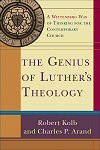
While other volumes are available that introduce readers to the theology of Martin Luther, this volume from two eminent Lutheran professors offers a unique approach. Rather than surveying traditional theological subject headings, they focus on two central ideas that informed the basic conceptual framework of Wittenberg theology.
The first presupposition concerns Luther’s anthropology. His well-known emphasis on justification by faith, or “passive righteousness,” described God’s grace. But Luther also emphasized a related aspect, the “active righteousness” of love that ought to shape and guide social relationships. The second presupposition concerns Luther’s focus on the way God works in the world through his Word—creative, incarnational, and sacramental. Taken together, Kolb and Arand find that these ideas formed a matrix that shaped the theological reflections of Luther and his disciples.
Twenty-first century Christians face significant challenges to their proclamation of the Gospel and to their existence as a faith community. Living in a tumultuous age, Luther faced equally challenging crises. His theological emphases, which are described and considered in this perceptive study, have much to offer contemporary pastors and theologians who seek to construct their own formulations of God’s message for the present age.
Aside from a few slogans and provocative quotes, Luther’s theology is largely unknown in the land that Bonhoeffer called ‘Protestantism without the Reformation.’ Christianity in America desperately needs the wisdom and penetrating insight into gospel logic that is winsomely introduced in this rewarding volume.
—Michael S. Horton, J. Gresham Machen Professor of Systematic Theology and Apologetics, Westminster Seminary California
This eminently readable volume marks a high point in theological reflection on Martin Luther’s contribution to today’s church. Eschewing standard topical analyses that have often distorted Luther’s thought, the authors—in essays focusing on God’s twofold righteousness and God’s powerful Word—have uncovered the very core of Wittenberg’s theological revolution in a winsome, nondefensive manner. They thereby provide a radically new perspective on contemporary Christian faith and witness. This book is an invaluable tool for preaching, teaching, and learning the faith.
—Timothy J. Wengert, Ministerium of Pennsylvania professor of the Reformation history, The Lutheran Theological Seminary at Philadelphia
Kolb and Arand have provided a great service to all who seek a deeper understanding of reformational theology. The Genius of Luther’s Theology is a fresh and innovative examination of the heart of Luther’s theology. This book makes Luther more understandable and thus more usable for readers of all levels.
—Jack Preus, executive vice president for mission advancement, Bethesda Lutheran Communities
Stressing Luther’s theological anthropology and his view of the living and active Word of God, Kolb and Arand have given us a useful, pertinent, and contemporarily significant introduction to the genius of the great reformer’s thought. This book is a valuable contribution to Luther research.
—Lawrence R. Rast Jr., professor of historical theology, Concordia Theological Seminary
Charles P. Arand is a professor of systematic theology and holds the Waldemar and June Schuette Chair in Systematic Theology at Concordia Seminary in St. Louis, Missouri. He is the author of That I May Be His Own: An Overview of Luther’s Catechisms and Testing the Boundaries: Windows to Lutheran Identity.
Robert Kolb is Emeritus Mission Professor of Systematic Theology and director of the Institute for Mission Studies at Concordia Seminary in St. Louis, Missouri. Among his many publications are The Book of Concord and Martin Luther: Confessor of the Faith.
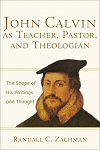
John Calvin has been the subject of numerous interpretative studies, but most have focused on only one aspect of his thought or a limited selection of his writings. Randall Zachman’s work on the reformer, however, adopts a uniquely holistic approach.
After a brief biographical chapter, Zachman provides a distinctive introduction to Calvin’s theological and exegetical writings, working from the reformer’s own understanding of his ministry as a teacher and pastor. Zachman then turns to consider Calvin the theologian. Despite the Reformation’s opposition to the use of images in the church, Calvin always balanced verbal proclamation with the idea of a visible manifestation of God—both in creation and in Christ. In this regard, Zachman analyzes Calvin’s analogical theology and contrasts it with the thought of Martin Luther.
This is a remarkably fresh and comprehensive study of the ministry and theology of the Genevan reformer, John Calvin. Randall Zachman has read widely in the whole Calvinian corpus as well as among the relevant secondary literature. He also places many of the topics discussed in their historical context, contrasting Calvin’s views with other reformers such as Luther and Melanchthon. The result is a very readable treatise that will be of interest not only to Calvin specialists but also to students and pastors. It is a major contribution to Calvin studies.
—I. John Hesselink, Emeritus Albertus C. Van Raalte Professor of Systematic Theology, Western Theological Seminary
This valuable collection of essays brings together in one volume the fruit of many years of careful study of Calvin. It will be a welcome addition to the libraries of all with a special interest in the reformer.
—A.N.S. Lane, professor of historical theology, London School of Theology
Randall Zachman brings to this book the kind of bite that makes for excellent intellectual history. Its most distinctive feature is a crisp pattern of organization, using John Calvin’s own writings to analyze in a fresh and persuasive way Calvin’s work—first as a teacher helping educated men become pastors, next as a pastor helping the laity understand basic Christianity, and finally as a theologian emphasizing the role of imagery in understanding what biblical Christianity is all about. The end result should be a deeper appreciation and a fuller understanding of the man who is the most influential architect of modern Reformed Christianity.
—Robert M. Kingdon, emeritus professor of history, University of Wisconsin-Madison
Randall C. Zachman is professor of Reformation studies at the University of Notre Dame. He is the author of several books, including Image and Word in the Theology of John Calvin.
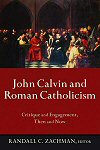
This informative collection offers a new approach to the study of John Calvin. The authors move beyond traditional approaches to consider the influential reformer within the broader context of the Roman Catholic Church and his complicated relationship to it.
Several themes emerge in these studies, including the sense in which Calvin saw himself as a church reformer rather than the founder of a new tradition; Calvin’s engagement with his Roman Catholic contemporaries; and the importance of contemporary Calvin studies produced by Roman Catholic scholars.
This volume provides pastors and church historians with thoughtful perspectives on Calvin’s reforming work and points to an emerging ecumenical spirit in which Protestants and Roman Catholics can acknowledge that they have much to learn from each other.
Able historians and theologians here take up the question of John Calvin’s relationship to Roman Catholicism. Polemics, dialogue, and engagement marked Calvin’s history with the Roman Catholics as it also did the churches stemming from Calvin’s influences. These pieces set the contexts, issues, and—in some cases—surprising results of these interactions. The studies benefit both Reformed and Roman Catholic traditions, offering not only enhanced knowledge but also ecumenical enrichment.
—Donald K. McKim, executive editor for theology and reference, Westminster John Knox Press
Serious reflection—especially theological—on the confessional distinctions and ecumenical commonalities of the Reformed and Roman traditions, traditions uneasily equipoised for many centuries, is long overdue. Zachman’s collection of essays importantly advances the conversation among those of ‘faith seeking understanding.’
—Charles Partee, P.C. Rossin Professor of Church History, Pittsburgh Theological Seminary
These wide-ranging essays address Calvin’s views of Roman Catholicism, early modern Catholic lives of Calvin, concrete interactions of Catholics and Reformed Protestants in the sixteenth and seventeenth centuries, and modern Catholic views of Calvin’s sacramentality. They suggest some unanticipated links, underline clear incompatibilities, and will prompt historical and theological reflection about the relationship of Calvin to Roman Catholicism.
—Brad S. Gregory, Dorothy G. Griffin Professor of Early Modern European History, University of Notre Dame
This collection of papers, by both Protestant and Roman Catholic scholars, is a valuable contribution to our understanding of Calvin and to today’s dialogue between the two sides.
—A.N.S. Lane, professor of historical theology, London School of Theology
These essays illustrate how Roman Catholic and Protestant scholars have moved from polemic to dialogue, in this case regarding interaction between John Calvin and Roman Catholicism. The result of this stimulating exchange is a new appreciation of Calvin’s catholicity and a better understanding of the Catholic milieu in which the reformer lived and worked.
—I. John Hesselink, Emeritus Albertus C. Van Raalte Professor of Systematic Theology, Western Theological Seminary
Zachman’s book offers an equal number of essays from Roman Catholic scholars and Reformed scholars, and it successfully balances the work of professors of historical theology and historians of the Reformation era. Historians, theologians, and pastors will profit from this book.
—John Patrick Donnelly, emeritus professor, Marquette University
Randall C. Zachman is professor of Reformation studies at the University of Notre Dame. He is the author of several books, including Image and Word in the Theology of John Calvin.
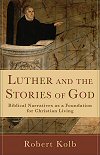
Martin Luther read and preached the biblical text as the record of God addressing real, flesh-and-blood people in their daily lives. He used stories of the faithful as depicted in biblical narratives to drive home his vision of the Christian life, a life that includes struggling against temptation, enduring suffering, praising God in worship and prayer, and serving one’s neighbor in response to God’s callings and commands. Against the backdrop of these stories—which reveal God’s action to reclaim and restore his fallen human creatures—Luther cultivated a life of repentance based on trust in God as he has revealed himself in Christ.
With both depth and clarity, leading Lutheran scholar Robert Kolb explores how Scripture undergirded Luther’s approach to spiritual formation. Professors and students in theology and Reformation courses, pastors, and readers interested in narrative theology and nurturing a faithful Christian life will value this work.
Written by one of the foremost Luther scholars of our day, Luther and the Stories of God provides an expert and engaging account of how the Wittenberg reformer sought to cultivate a rich sense of Christian identity in his contemporaries through narrative, both in his teaching and preaching of the Word of God. Kolb masterfully shows how Luther invited his hearers and readers into a conversation with the speaking Creator God, a conversation that was to define them as human beings and sustain them as they faced the vicissitudes of life in a fallen world. Valuable for historians, theologians, and literary scholars alike, Luther and the Stories of God contains much that will be of interest and inspiration to anyone who wishes to engage in the same divine conversation today.
—Ronald K. Rittgers, Erich Markel Chair in German Reformation Studies, Valparaiso University
In this fine new book Robert Kolb outlines an approach to the moral life that is neglected in Luther studies: that Luther employed biblical storytelling as a way to form the moral imagination and thereby strengthen and enrich the Christian life.
—Robert D. Benne, Emeritus Jordan Trexler Professor, Roanoke College
With one eye on the current philosophical and theological interest in narrative, Kolb depicts Luther’s theology as his own version of the Christian metanarrative. To ‘live a Christian life’ means finally to fashion one’s personal story so that it merges seamlessly with this metanarrative. Luther used the Bible’s rich trove of stories to teach people how to do this. A creative and yet profoundly faithful restatement of what Luther’s project was really about.
—Denis R. Janz, Provost Distinguished Professor of the History of Christianity, Loyola University New Orleans
Martin Luther was a great church leader and storyteller. Robert Kolb is a great Luther scholar and churchman. Here we have the dream combination, as Kolb offers an interpretation of Luther’s theology which brings the Reformer’s thought into dialogue with contemporary theology and church life. A must read for all who, like me, have learned so much from both men over the years.
—Carl R. Trueman, professor of historical theology and church history, Westminster Theological Seminary
Robert Kolb is emeritus mission professor of systematic theology and director of the Institute for Mission Studies at Concordia Seminary in St. Louis, Missouri. Among his many publications are The Book of Concord and Martin Luther: Confessor of the Faith.
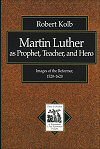
Despite the vast number of studies concerning the life and teaching of Martin Luther, scholars have not previously considered the ways in which his contemporaries and successors used his influence in the German Reformation. Robert Kolb treats that subject in this well-researched volume on the continuing role of Luther’s legacy. The following generations of Reformers, he argues, used Luther in different ways as they sought to deal with the changed circumstances of the church in their own age.
Kolb suggests three categories to describe the ways in which Luther’s disciples used his influence and adapted it to the needs of the church in their respective ages: prophet, teacher, and hero.
- Prophet—During his own lifetime and immediately thereafter, Luther was often identified with the biblical prophets as having a unique authority from God to challenge the place of the papacy.
- Teacher—As internal conflicts and doctrines increasingly came to the fore, Luther was seen as the authoritative interpreter of Scripture whose writings could be cited as the definitive proofs on any disputed points.
- Hero—By the end of the sixteenth century, much less emphasis was placed on Luther as a distinctive and authoritative prophet/teacher, and he was more often revered as the hero of the national church whose courage was celebrated in art and on stage.
The second section of the work focuses more particularly on the use and collection of Luther’s writings. Kolb recounts the stages of publication as Luther’s many treatises, pamphlets, and sermons were gathered for varying purposes. Collected editions were issued, and then topical and systematized selections were gathered for teaching and edification on specific topics. These stages of publication reinforce the author’s thesis concerning the changing use of Luther’s legacy. Over the course of the century, his writings were no longer cited as uniquely authoritative, rather they were used for edification—the prophet/teacher had become the national hero.
Students of Luther in particular and of the Reformation era in general will find this volume to be of great value. The author’s unique approach to Luther’s lasting legacy in the German church provides an entirely new perspective that moves scholarly discussion ahead significantly.
Robert Kolb’s study of changing interpretations of Luther’s life and work is a valuable contribution to Luther studies. In particular, it demonstrates the impact of Luther on German theological thinking since the sixteenth century.
—John Johnson, president, Concordia Seminary
Professor Kolb has woven a fascinating tale about the effect of Luther on his theological heirs. Here, in an easy-to-read, yet scholarly account, the reader is expertly led through a labyrinth of sixteenth-century Luther reception. Kolb’s grasp of the pertinent secondary literature and his command of a vast array of primary sources combine to reveal the variety of ways early Lutherans and others sought to comprehend how the Reformer had changed the religious and social landscape of the early modern German lands. This is a landmark study with which everyone interested in Luther studies will need to grapple.
—Timothy J. Wengert, Ministerium of Pennsylvania Professor of the Reformation History, The Lutheran Theological Seminary at Philadelphia
Kolb’s study, written in his typically clear style and based on thorough research, is a valuable contribution to our understanding of the development of Lutheranism.
—Sixteenth Century Journal
For anyone interested in ‘how Luther after his death continued to function as an authority, as a teacher, and as a hero for those who claimed his name’ and how Luther’s heirs conceived ‘the nature of authority within the church . . . in the midst of a changing society,’ Kolb’s study is both unique and indispensable.
—Lutheran Quarterly
Kolb is a seasoned Reformation scholar and a leading expert on Lutheran developments in the century after Luther. His wide readings and careful research are reflected in this book, which does a real service in elucidating a complex but important period.
—Religious Studies Review
Robert Kolb is emeritus mission professor of systematic theology and director of the Institute for Mission Studies at Concordia Seminary in St. Louis, Missouri. Among his many publications are The Book of Concord and Martin Luther: Confessor of the Faith.
Reviews
3 ratings

Ralph A. Abernethy III
9/7/2017
Curtis Dubreuil
10/15/2013
Clovis Jair Prunzel
8/31/2013